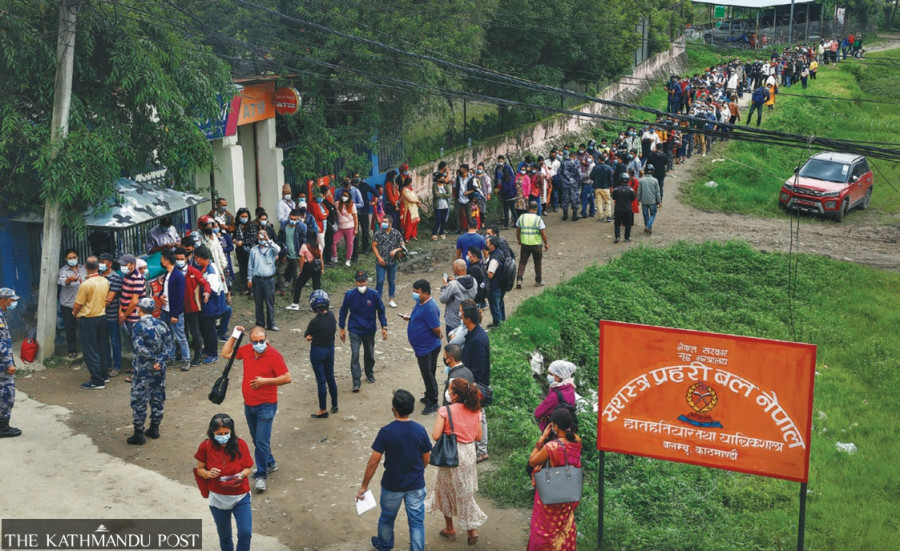Health
Nepal’s search for Covid vaccines continues, but no new deal in sight yet
Currently only those above 18 are being immunised and no plan has yet been announced to vaccinate those under 14 who account for 28 percent of the population.
Arjun Poudel
Covid-19 vaccine doses may have been trickling in lately, but Nepal’s struggle to secure additional jabs is not over yet, with Health Ministry officials saying the government is ready to grab any opportunity to procure them from any company or country willing to sell the shots.
“Our efforts are on, but we have not been able to sign any new deal with any vaccine manufacturing firm or country to procure vaccines,” said Dr Roshan Pokhrel, a secretary at the Ministry of Health.
Nepal so far has Covishield, the AstraZeneca type vaccine manufactured in India, Vero Cell of China’s Sinopharm, and Janssen of Johnson & Johnson to inoculate its population. A majority of the doses were supplied to Nepal under grant assistance or through COVAX, an international vaccine-sharing scheme backed by the United Nations.
Officials say the government is also in talks with companies like Moderna and Pfizer-BioNTech.
“There has not been any progress in buying vaccines from Pfizer-BioNTech, but we are ready to pay if the company is ready to sell,” Pokhrel told the Post.
Nepal had in the third week of April, through its embassy in Washington, DC, approached Johnson & Johnson and Moderna to buy 5 million and 2 million doses, respectively. But both American firms had expressed their inability to supply the jabs before 2022, citing supply chain constraints.
Officials say the government has been pulling out all the stops to secure vaccines but given the shortages, pre-booking orders and supply chain constraints, it has not been able to make substantial progress.
“We [the government] had sent diplomatic notes to the governments of major vaccine producing countries like India, China, Russia, the United Kingdom and the United States to help facilitate vaccine procurement for us, saying we are ready to pay for the shots,” said an official at the Health Ministry who did not wish to be named. “Several rounds of talks were also held with various firms, including Pfizer-BioNTech.”
The Pfizer-BioNTech Covid-19 vaccine is an mRNA vaccine that is reported to be 95 percent effective at preventing laboratory-confirmed SARS-CoV-2. The double-shot vaccine has to be administered within a gap of 21 days.
The US Food and Drug Administration has even authorised the use of Pfizer vaccine on children between 12 and 15 years.
Nepal, meanwhile, has yet to roll out any plan to inoculate children aged 14 and below. The group accounts for 28 percent of the total population.
Officials say if the government could procure Pfizer vaccines, they will be administered to those aged 12-18. At present only those above the age of 18 are being immunised against Covid-19.
According to the latest data from the Health Ministry, 55,904 children under 18 years have been infected with Covid-19 so far and 80 of them have died.
Public health experts say children should definitely be vaccinated against Covid-19 when vaccines suitable for them are available but the immediate target groups should be those at risk, especially the elderly and people with comorbidities.
“Providing vaccines to children is a good decision but we should not forget that hundreds of thousands of people in risk groups have not been inoculated yet,” Dr Shyam Raj Upreti, coordinator of the Covid-19 Vaccine Advisory Committee, told the Post. “This is the time to secure as many doses of vaccines so that authorities can inoculate the maximum number of people while prioritising those who fall within the risk group.”
Few countries, which have administered the jabs to the majority of the adult populations—France, Germany, the United States and Austria—have either started or decided to provide Pfizer vaccines to children aged 12-15.
“A lot of countries have yet to start administering Covid-19 vaccine to children but we should focus on the adult groups first,” said Upreti.
As many as 1.4 million people aged 65 and above in Nepal have not received their second shots of Covishield even though they had taken their first doses more than four months ago—in the second week of March.
Officials hope to give them their booster doses once the 1.6 million doses of AstraZeneca vaccine, provided by Japan through COVAX, arrive. The vaccine is expected to arrive within this week.
After launching its vaccination drive on January 27 with the 1 million doses of Covishield provided by the Indian government under grant assistance, Nepal had signed a deal with the Serum Institute of India to buy 2 million doses in February. But the company has supplied only 1 million doses so far.
So far China has provided 1.8 million doses of Vero Cell vaccine under grant assistance. Nepal has signed a deal with Sinopharm to procure 4 million doses of Vero Cell and so far received 3.2 million doses. China has announced an additional 1.6 million doses of Vero Cell under grant assistance.
The United States on July 12 provided 1,534,850 doses of single-shot Johnson & Johnson vaccine through COVAX.
The COVAX facility had first provided 348,000 doses of Covishield in March. It has committed to providing around 13 million doses, enough to inoculate 20 percent of the 30 million population.
So far, 3,650,733 people have taken the first dose of the coronavirus vaccine and 1,548,803 have been fully immunised, which is around 5.1 percent of the population.
The government has committed to providing free Covid-19 jabs to 72 percent of its population over 15.
“If the vaccine can be administered to children under 15, the government will arrange the vaccine for them also,” Dr Samir Kumar Adhikari, joint spokesperson at the Health Ministry, told the Post. “The government is aware that millions of adults over 18 are yet to get vaccines and our fully vaccinated population is very low.”




 26.7°C Kathmandu
26.7°C Kathmandu















